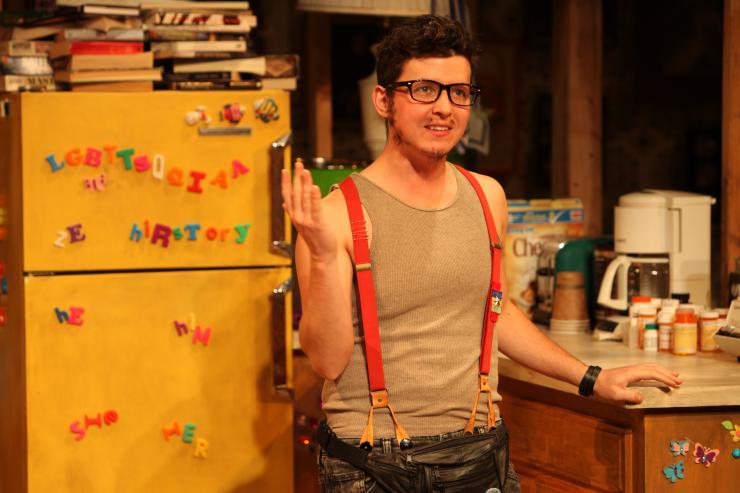The Theater Was Ours
Next Gen Nights and Hir at the Magic Theatre
“A nation's greatness is measured by how it treats its weakest members.”—Gandhi
If we applied Gandhi’s metric to theater, we’d be judging ourselves by how we treat—not the “weak” per se, but those who aren’t already running the show: poor audiences and young artists. Much like politicians, theater companies excel at paying lip service to these underserved without actually serving them.
What sets Next Gen apart, however, is that there’s no arbitrary age cutoff. Once you go from 29 to 30, or cross some other numeric threshold, most theaters assume you’ve magically started to make it in life
The Magic Theatre’s Magic Next Gen buck this trend. For one performance in each production this season, the San Francisco theater is offering $10 tickets to members of the “next generation”: “students, emerging artists and young professionals.” This might sound unremarkable—theaters all over the country have special nights for younger age groups or always discount their tickets for, say, the under-30 crowd. What sets Next Gen apart, however, is that there’s no arbitrary age cutoff. Once you go from 29 to 30, or cross some other numeric threshold, most theaters assume you’ve magically started to make it in life, that regular-price theater tickets won’t set you back for the rest of the month, and that you can be marketed to and generally treated like a median-aged theatergoer. Members of the Magic’s Next Gen, by contrast, self-select, reflecting the fluid boundary between “emerging” and “established,” between discount single ticket buyer and patron.
“It’s really about if you identify as a young emerging artist or professional or student,” says artistic director Loretta Greco. “We’re not going to card you. We’re not going to ask for your birth certificate. If you honestly feel like you need this help and you’re interested, my thing is just, let’s get you in the door.”
So far this year, the Magic’s Next Gen nights—which were masterminded by development and marketing associate Lorna Velasco, associate artistic director Ryan Purcell and Greco—have constituted discounted tickets and a free drink. But at its most recent, for the February 7 performance of Hir, by Taylor Mac, the company took it up several notches: offering a four-course meal (the Magic formatted part of its lobby as a pop-up restaurant) catered by Comestible plus a glass of wine and a theater ticket, for $25.
This event was so successful—it sold out within weeks of tickets becoming available, says Velasco—for multiple reasons. First, it capitalizes on San Francisco’s obsession with food. “Pop-up dinners are so popular here in San Francisco,” says Velasco. “It’s a social thing, it’s such an event.” Second, it recognizes that audiences want to spend time together outside of actually seeing the show—when often you can’t really socialize. “Part of it was logistical,” says Purcell. “We’re in this location—there’s not a big bar scene by us; there aren’t good, affordable restaurants. We wanted to create a social space that engendered discussion right here, so you can come and have the same experience but without having to disperse to your separate places.”
Although tickets to the dinner were limited to Next Gen patrons, tickets to just the show were open to everybody, creating a strikingly mixed audience. “Loretta and I are big, big believers in that it’s not just getting a group in,” says Purcell. “It’s integrating that group with the rest of your audience. Bringing in the next gen—it doesn’t affect just them; it also affects the traditional audience.
“We don’t want to send the message that theater is mostly for old people, but one day a year, it gets to be for young people,” he continued. “It’s not a separate event. It’s not normal theater and then next gen theater. Good theater is those two groups colliding.”
The Next Gen dinner before Hir was the first time I’ve ever seen a major theater taken over by young professionals. Here we were on a Friday night and the theater, not just some darkened corner of it, was ours. As we raised our glasses, I thought that this was the kind of scene that would normally be populated by major donors: a catered meal with table service, a special talk by director Niegel Smith. Many of us probably won’t go on to become those major donors, but the Magic nonetheless treated us like royalty and also like family, as gracious hosts do.
According to Velasco, Purcell, and Greco, Next Gen nights came about as a result of longstanding discussions about access—and also a gift. “There was an anonymous donor who specifically wanted the Magic to create new subscriptions from a special group, outside the people that we usually happen to get,” says Velasco. “But they never really gave us specifics on what that is. It was general enough that we could cater it to, ‘Okay, how do we want to diversify our audience?’” Velasco says there was really never a question as to which group they would target: young people. But then they had to get 200 new subscriptions, and even at a forty-dollar price (for a five-play season), nobody from the targeted group subscribed. “They don’t want to commit,” Velasco says.
She then tried a new tactic, surveying the single ticket buyers at the first two Next Gen nights of the company’s season. “The people who were taking advantage of it—over half were young professionals [i.e., non-theater people], people in their mid-20s and 30s,” she said. “About a quarter consider themselves emerging artists, and then the rest were students. 56 percent were people of color.”
This data surprised the Magic. “We thought it would be mostly students,” Velasco says.
But it also jives with how the theater’s been thinking more broadly about the next generation of theater. This and other Next Gen nights are just one piece of a larger effort by the Magic. “We’ve offered $20 tickets; we’ve always offered a fair discount off of the subscription for students and seniors,” says Greco. “But in the last eighteen months, with a couple of wonderful funders, we’ve also been thinking about ‘next generation’ in a more comprehensive way. And that’s not to say that we’re completely there yet or that we’ve figured out how to save the world, but we’re trying to do something that’s comprehensive.” That means cultivating, in addition to new audiences through its Next Gen program (which also features free daytime performances for high school students), future artists through a partnership with Laney College, future leaders through its fellowship program. It’s also got a future funders program in the works. The goal of all this, says Greco, is to make the Magic’s audience look like its work: “young, hip, diverse economically, and culturally.”
Hir, which chafes at American dramatic tradition in exciting ways, is precisely the kind of work that should be put before the audiences, artists, leaders and philanthropists who will be reshaping that tradition.
Isaac (Ben Euphrat), on leave, or so it seems, from the military after not speaking to his family for a year, can’t stop vomiting, particularly when his mother Paige (Nancy Opel) uses the blender to make her husband Arnie (Mark Anderson Phillips), who’s suffered a “little stroke,” a cocktail of pills. Max (Jax Jackson), the other son, since Isaac’s departure, is no longer a he/him, but a ze/hir, forging a fluid gender identity within, as Paige says, “the LGBTTSQQIAA community. Or what I call the gender of Lugubuttsqueeah.”

Photo: Jennifer Reiley
The Magic also did a production of Sam Shepard’s Buried Child this season (in honor of the playwright’s seventieth birthday), and the similarities between Mac’s play and Shepard’s oeuvre are striking. There’s the patriarch who’s failed his family financially but who nonetheless acts like a king, spewing abuse emotional and physical; a prodigal son whose homecoming is met with zero ceremony as he insists on a past that never was while his family erases, and already has erased, him from the present; a connection between that father and that son that’s stronger than violence and hatred, that’s bound by a ritualistic passing down and expression of masculinity; a house whose shabbiness and disrepair physicalizes the family’s state; a tribalism, an us-vs.-them mentality so intense that the outside world doesn’t seem to exist.
All of these calamities stem from the failure of the father to adapt and prosper amidst economic and social upheaval; in Hir, that failure goes a step further than Shepard’s plays do; it’s more complete and humiliating. “You’re a man,” Isaac says to Arnie, remembering the past:
You’re stern. You get red raced. You beat the dog with a bat for barking too loud…And you take up space. You sweat. You leave your mark. Yellow stains on everything white. Under your pits, around your collar, on the toilet seat. You dole out allowances and punishments. You give me, you give mom, us, bruises, welts when we do things or when we’re too loud. You break our fingers if we leave a dirty dish in the sink.
But since his stroke, Arnie lumbers around the house like an overgrown baby, unable to control his bladder, gurgling most of the time, and mostly repeating others’ words when he does talk, asserting agency of any kind only a few times in the entire play. Paige keeps him in line by squirting him with a spray bottle; the house’s mess is part of her liberation from Arnie.
By contrast, Sam Shepard’s patriarchs are abusive drunkards until the end, and then Shepard kills them off. In Hir, Arnie is not gone and is not quite powerless—the memory of his former self is still enough to inspire shudders—but he is no longer a part of the power jockeying. Mac has subtracted a constant from the equation of the great American family drama. It’s refreshing in that Paige, Isaac, Max and, yes, Arnie are working out how to exist from scratch. They’re very bad at it, which can be a joy to watch, as when all zero in on the string Max keeps mistakenly playing during a banjo demonstration.
The play has leaps in tone that create genuine suspense—not just in what’s going to happen next, but in what kind of play will result. It’s this kind of rule breaking and rewriting that offers fertile ground for a transgender character who is allowed to be much more whole than many other plays permit. In Hir, the character of Max is, in a lot of ways, like many other teenagers—flawed, figuring it out.
Hir is helping to lay the path for what will be, and the Magic is contributing greatly to that effort by letting the artists who will write that drama have access to this play.


Comments
The article is just the start of the conversation—we want to know what you think about this subject, too! HowlRound is a space for knowledge-sharing, and we welcome spirited, thoughtful, and on-topic dialogue. Find our full comments policy here